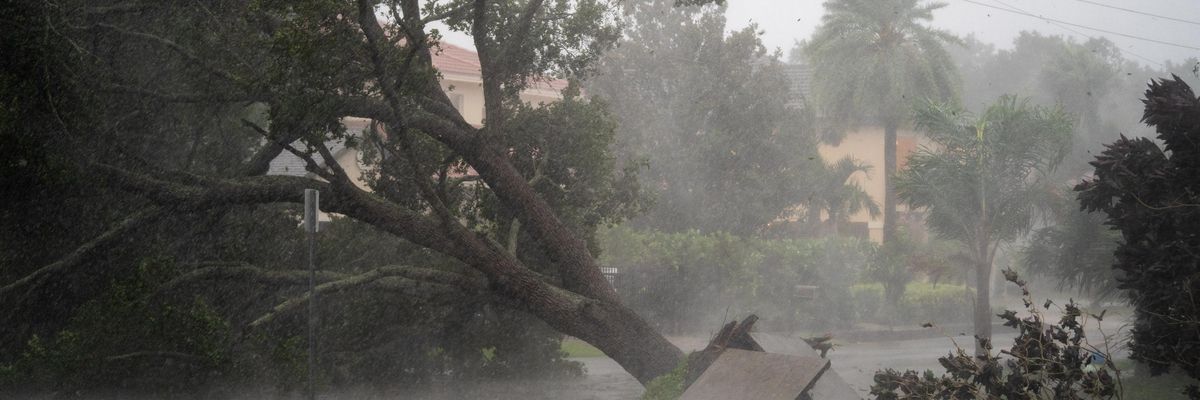Hurricane Ian left massive destruction in its wake as it ripped through Florida on Wednesday, flooding buildings, uprooting trees, and sending cars and houses floating downstream as those in the storm's path sought safety from the powerful wind and torrential rain.
After making landfall in southwest Florida as a Category 4 hurricane, the storm battered the state with sustained winds upwards of 150 miles per hour and hit the peninsula with what the National Hurricane Center (NHC) described as "catastrophic storm surge." In some areas, according to state authorities, storm surge reached as high as 12 feet.
Nearly 2 million Floridians were without power as of late Wednesday and many people arrived at emergency shelters unsure of whether they would have a home to go back to in the days ahead. Others, either unable or unwilling to flee, were trapped in their homes and apartment buildings.
It's unclear how many people were killed by the storm as it hammered Florida. As Reuters reported, "U.S. Border Patrol said on Wednesday that 20 people were missing off the coast of Florida after a Cuban migrant boat sank due to Hurricane Ian." At least two people in Cuba were killed by Hurricane Ian.
Characterized as one of the strongest hurricanes to ever make landfall in the United States, the storm has weakened significantly since mid-afternoon Wednesday. But the NHC said in a Thursday morning update that it is "still expected to produce strong winds, heavy rains, and storm surge across portions of Florida, Georgia, and the Carolinas."
Video footage posted to social media throughout the day Wednesday offers a glimpse of the damage Ian wrought:
The full extent of Ian's destruction won't be clear for weeks. Florida Gov. Ron DeSantis said that President Joe Biden quickly approved his request for a federal disaster declaration, and the president spoke with local officials Wednesday to offer full federal support, according to a White House readout of the calls.
In a column for The New Yorker, environmentalist Bill McKibben wrote that the immediate "task for Floridians is survival, and the next week's task--which the nation should share--is recovery."
"But the other job is limiting the danger going forward," McKibben added, "and it must be approached with the same energy that Ian is bringing onshore this week."
Scientists have said that waters made warmer by the climate crisis likely played a role in Hurricane Ian's quick intensification as it barreled toward Florida's coast after ravaging Cuba earlier this week.
"On Monday morning, Hurricane Ian had wind speeds of 75 miles per hour," noted Vox's Benji Jones and Umair Irfan. "Just 48 hours later, those speeds had more than doubled. On Wednesday, as the storm made landfall in southwestern Florida, Ian's wind hit 155 mph--just shy of a Category 5 storm, the most severe category for a hurricane."
Brian McNoldy, a hurricane researcher at the University of Miami, told the pair that "even small changes [to ocean temperatures--half a degree C, or a degree--can really make a big difference."
"We've been able to let the Gulf sit and bake throughout hurricane season," Miller said. "There's this pristine Gulf of Mexico from a sea-surface temperature standpoint, and Hurricane Ian has been able to exploit that."
Before Ian made landfall in Florida Wednesday afternoon, Biden faced calls to declare a national climate emergency, a step he has considered but thus far declined to take. The move would unlock key federal authorities and resources enabling the president to slash emissions that are fueling the climate emergency.
"Always remember that climate breakdown is only getting started," warned climate scientist Peter Kalmus. "It will keep getting worse so long as the fossil fuel industry exists. Cause, effect."




